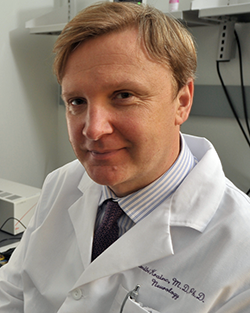Krainc Presented with 2025 Tripartite Prize
Dimitri Krainc, MD, PhD, chair of the Ken and Ruth Davee Department of Neurology and Aaron Montgomery Ward Professor, has been named the winner of the 2025 Tripartite Legacy Faculty Prize in Translational Science and Education.
“I am truly honored to be named the winner of this award,” Krainc said. “However, nothing in medicine and research happens without the support of strong and collaborative teams. I’d like to acknowledge our trainees, colleagues and also my family who play a key role in everything I do.”

Krainc is also the director of the Simpson Querrey Center for Neurogenetics and director of the Feinberg Neuroscience Institute. His lab has discovered how lysosomes and mitochondria interact in normal and diseased cells, work that opened a new area of cell biology for studies of diseases that involve mitochondria and lysosomes and led to pioneering design and development of targeted therapies.
In addition to the Tripartite Award, Krainc has received the Javits Neuroscience Investigator Award, an Outstanding Investigator award from NIH, and was elected to the Association of American Physicians, National Academy of Medicine and the National Academy of Inventors. He is the principal founding scientist of two biotech companies and serves as president-elect of the American Neurological Association.
“I’ve been very grateful to my mentors who helped me appreciate that a better understanding of the biology of neurodegeneration is the foundation of discovering new treatments,” Krainc said. “Likewise, I have been trying to inspire our trainees and faculty to participate in research or collaborate with researchers to ultimately discover new treatments for currently untreatable conditions.”
Longtime colleague Farzaneh Sorond, PhD, vice dean of Faculty Affairs and Dean Richard H. Young and Ellen Stearns Young Professor, nominated Krainc for the award. She said she has known Krainc since he was a junior resident at Massachusetts General Hospital.
“The Tripartite Award at Feinberg is designed to recognize our faculty who really excel in the tripartite mission of the school which is translational research, leadership, mentoring and education, and I thought he was the perfect candidate for this recognition,” Sorond said. “Dimitri has a good eye for talent. He really tailors mentoring to that individual with a significant amount of diversity in who the mentees are and really does an exceptional job.”
Yvette Wong, PhD, assistant professor of Neurology, was a post-doctoral scholar in Krainc’s lab for several years before starting her own lab at Feinberg.
“Dr. Krainc has been a really great mentor,” Wong said. “I’ve been really fortunate to have his support throughout my postdoctoral training.”
The Tripartite Legacy Faculty Prize is given annually to a faculty member who has demonstrated excellence in research that emphasizes translational approaches, teaching and mentoring, and leadership. Sponsored and supported by the Office of the Dean, this award is made possible through the generous support of family members and friends of Geoffrey Kent, MD, PhD.
The prize was established to commemorate the medical teaching legacies of Abraham Albert Hijmans van den Bergh, MD; Isadore Snapper, MD; Hans Popper, MD; Fenton Schaffner, MD; and Kent. European-born and educated, their lives were forever changed by the Holocaust and World War II, and all but Hijmans van den Bergh reached the U.S. to continue their careers and briefly worked together at Cook County Hospital in Chicago. Through their prolific collaborations and publications, Snapper, Popper, Schaffner and Kent emerged as international leaders in the study of liver disease.
Legal Disclaimer:
EIN Presswire provides this news content "as is" without warranty of any kind. We do not accept any responsibility or liability for the accuracy, content, images, videos, licenses, completeness, legality, or reliability of the information contained in this article. If you have any complaints or copyright issues related to this article, kindly contact the author above.
